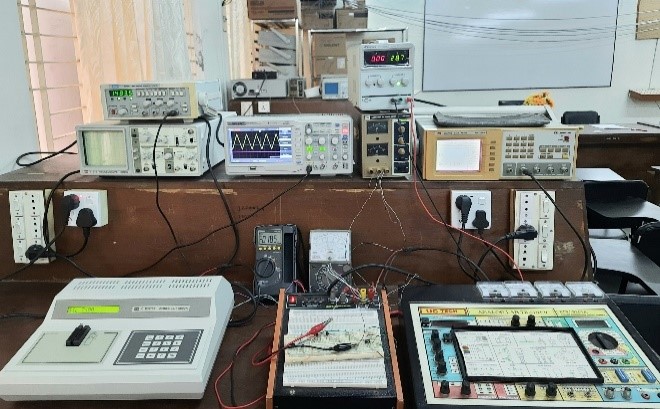
In this laboratory, students become familiar with the basic electronics equipment, power supplies, function generators, and oscilloscopes. The students can do basic electrical and electronic measurements using analog and digital multi-meters. They also learn how the basic electronics components such as resistors, diodes, transistors, and Op-amps work. Upon completion of this laboratory works, students should be able to design, assemble, and use basic electronics circuits and have the necessary skills to measure and characterize their performance.
Main equipment:Oscilloscope -oS5100, Function Generator Model: GFG 8210, Signal Generator, Analog/Digital Trainer Kit, Meter: LCR meter, Digital & Analog multi meter, Pencil & IC Tester RAW Materials: IC, Transistor, Transformer, Speaker, DC Motor, Diode, LED, J-FET, UJT, MOSFET, Diac, Triac, SCR, 7-Segment Display, PCB Fabrication tools.
The communication system laboratory consists of different analog and digital communication trainers for doing experiment and research. Analog communication trainers deal with different analog modulation and demodulation schemes. In contrast, digital communication trainer deal with the principles and theory of digital communication i.e. signal space, bit error rate analysis, frame synchronization, symbol synchronization, familiarization with multiplexing and de-multiplexing techniques and constellation diagrams. This laboratory is also equipped with experimental setup of optical fiber communication and passive optical network.
Main equipment:Digital Communication Trainer, BPSK, DPSK, QPSK, ADCL-123, ACAML Analog Communication System, AM Transmitter, Telecommunication Trainer, Digital Telephone Exchange DL-2156D1, Mobile Communication Trainer Base + Remote Unit (MAN & TEL), Fiber Optic Lab Equipment with different Line coding devices, Fiber Optics Coupler & WDM Board, WIMAX and CDMA Training System, Splicer, OTDR, PON Devices. VPI Transmission Maker Simulation Software, Photon Design Software (FIMWAVE/FIMPROP).
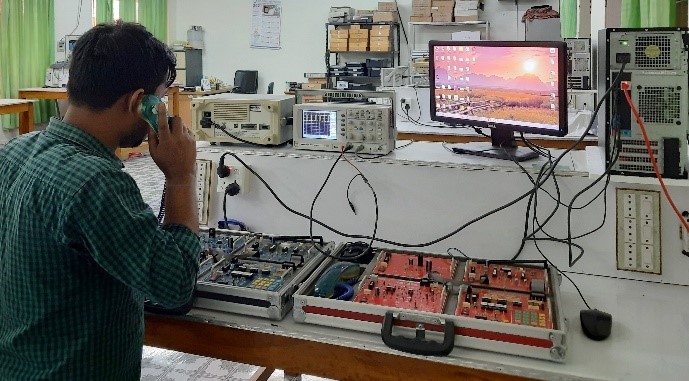
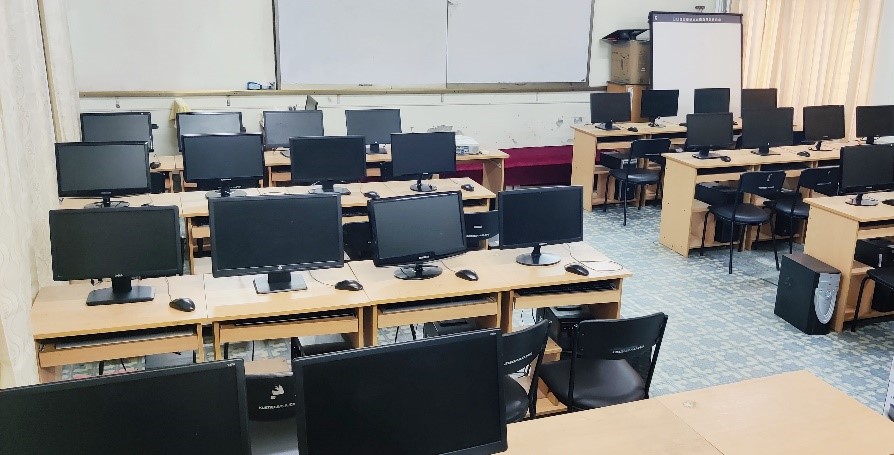
This laboratory provides a practical knowledge of digital signal processing (DSP) including discrete-time linear systems, filtering, sampling, and discrete-time Fourier analysis. This lab facilitates the analysis of discrete-time signal, continuous-time signal and the conditions for perfect reconstruction of signal as well visualization of Fourier transform, Fourier series, Discrete Fourier transform, Z-transform etc. by using numerical simulation in MATLAB. Xilinx ISE software is also used to design and simulate the VLSI system by Verilog HDL language.
Main equipment:Digital Signal Processing Trainer, MATLAB Software, LAB View Simulation Software, Xilinx ISE software, Code Block, Turbo C etc.
In this laboratory, student get the opportunity to apply their theoretical knowledge into writing program code in assembly language. The students able to understand the internal architecture of various microprocessors and get hands on experience of interfacing microprocessors with various peripherals. They also get hands on experience of designing various controllers and automation systems using microcontrollers.
Main equipment:Microcontroller trainer 8085, microcontroller Trainer 8086, Industrial Electronics Trainer, PLC Trainer Model: WSB-60, Advance automation system Module Model: FAST-5000, Universal Loader, Raspberry Pi, Arduino Mega 2560 and Arduino Uno Microcontroller etc.
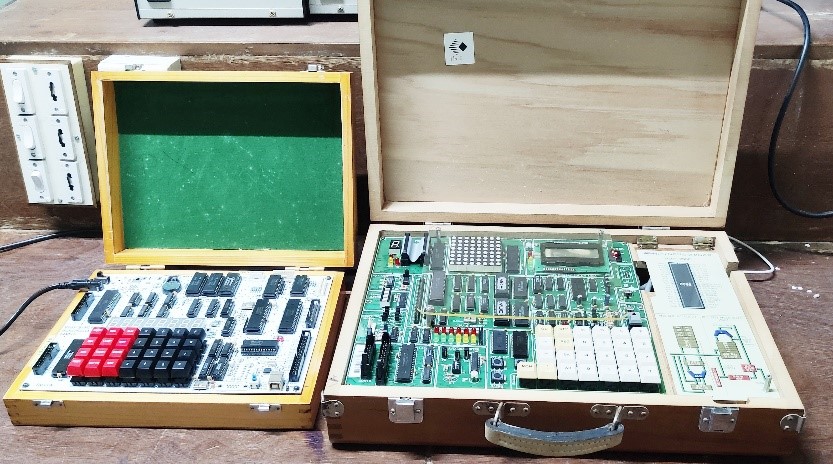
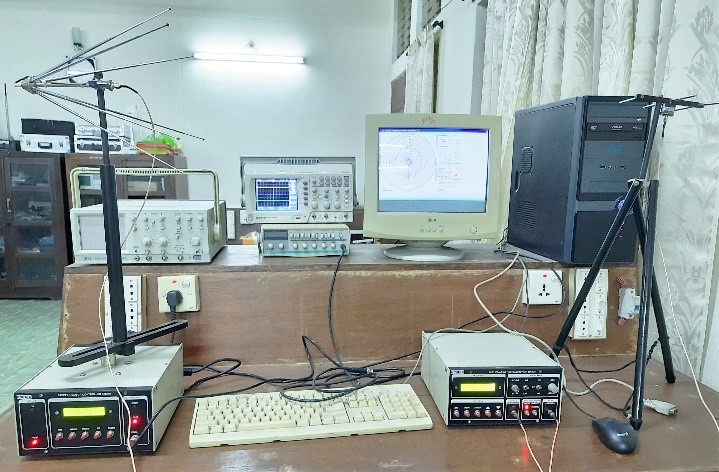
This laboratory familiarizes the students with design, measurement techniques and characterizations of microwave components and devices using spectrum analyzers, vector network analyzers and some computer software. After basic calibration procedures the students should be able to design microwave circuits including attenuators, filters and impedance matching circuits. The students also observe performances of different types of antennas. After acquiring enough knowledge each student has to design microstrip patch antenna using software and fabricates them. The measured results of those antennas are compared with simulation data.
Main equipment:Microwave Trainer ED 3000, Advanced Micro link ECAML-MW10 Series, Antenna Trainer ED 3200, Antenna Trainer Watts 2002 and Matts 1000, Transmission line, Vector Network Analyzer Model: E5071C-285, Spectrum analyzer SM5010, CST Microwave Studio, PCB Antenna fabrication Machine (MITS).
This laboratory is equipped with smart devices which are used for advanced research on communication and networking. Characterization of different types of linear and nonlinear devices, two-port networks such as amplifiers and filters, can be done here. In this laboratory, students can get hands on experience of Design, installation, and Set-up of computer networking including server, configuration of switch and router, implementation of different routing protocols. This lab also provides the simulation test of designed network using Cisco Packet Tracer Software.
Main equipment:Vector Network Analyzer, Anechoic Chamber, PLC Trainer and Advance Automation system module, Cellular Mobile Trainer, Optical Fiber and WiMAX Communication Trainer, Computer networking basic equipment, Cisco Packet Tracer Software for network simulation, Advanced Communication Trainer Kit (TIMS, ETT Series).
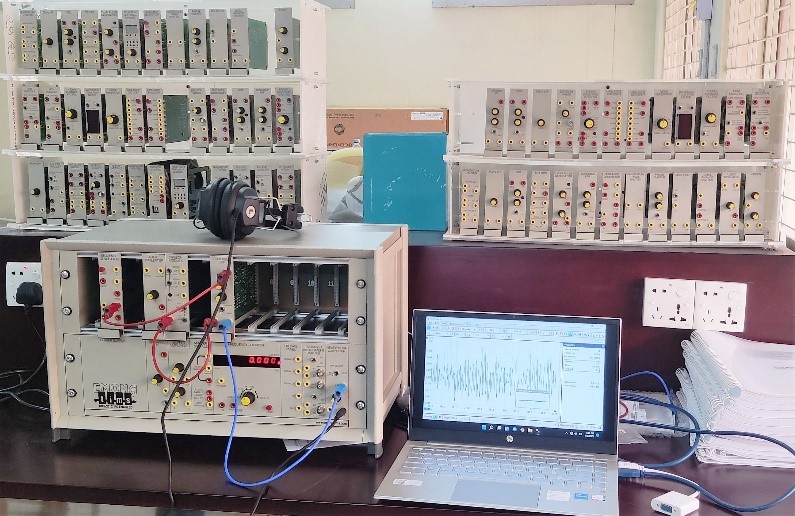
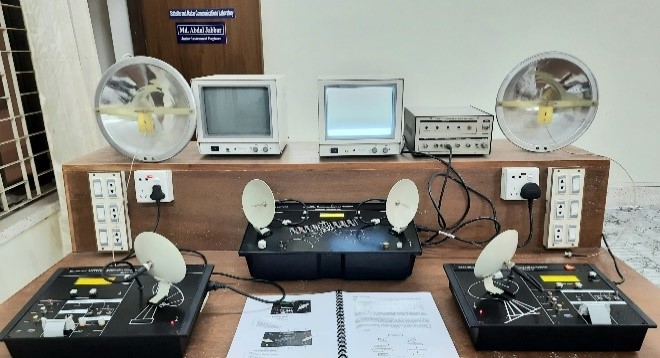
This laboratory provides a very good practical knowledge of Satellite Communications & Radar with hands-on experiments. The student use Satellite Communication trainer kits and real Radar equipment including different navigation tools. They are able to setup a practical communication link by getting experience from this laboratory.
Main equipment:GPS Trainer, Satellite Communication Trainer (Satellite Transponder, Uplink Transmitter, Downlink Receiver), Radar JRC Navigation with Accessories M-M10-SP3003L, VHF Tx/Rx Set JRC with Accessories M-JHS-32A and GPS Navigation FURUNO with Accessories.
The faculty members and the students of this department are very active in conducting research as a part of their UG and PG program and also engaged with other organizations in home and abroad through mutual collaboration. Moreover, in this department 4 projects, funded by Higher Education Quality Enhancement Project (HEQEP) of the University Grants Commission, Bangladesh, were completed successfully. The projects are entitled as: (?) Developing Research Facilities for Teachers and Students in Department of Electronics and Communication Engineering at KUET, (?) Establishment of Virtual Lab for Collaborative Research in the area of Signal Processing and Communication Engineering, (?) Capacity Enhancement of Undergraduate & Postgraduate Classrooms and Laboratories for innovative Teaching, Learning, and Research, and (?) Developing Research Facilities for Teachers and Students in Department of Electronics and Communication Engineering at KUET. The faculties and students are actively engaged with these developed research facilities in doing postgraduate degree and publications.
Manipulation of Electrons Club (MEC)The enthusiastic students of Electronics and Communication Engineering run an electronics club named Manipulation of Electrons Club (MEC). The students under this club design electronic circuits for various applications including automation, Control, sensor network, radio network, UAV and robotics. They also arrange different technical workshops and competitions regularly. The students also attend different national and international competitions from this club. This club is situated in the ground floor of ECE department.
Idea ContestStudents share their innovative ideas about software and hardware in intra Department Idea contest organized by ECE association. They exposed their knowledge in developing mobile apps, security systems, use of technology to assist disabled person as well as to solve the real-world problems.